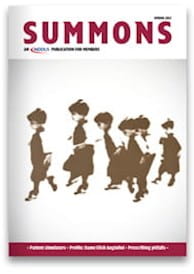Maurice H. Papworth was accused of washing his profession’s dirty linen in public when he blew the whistle on unethical research practices in the 1960s, but is now recognised as one of the pioneers of modern research ethics.
Pappworth was born in Liverpool in 1910, the second son of an Eastern European family of Jewish immigrants. He went on to study medicine at the University of Liverpool and passed his MRCP in 1936. He hoped to make a successful career as a consultant physician in a London teaching hospital, but he was never to realise that ambition. Whether this was because of his abrasive and outspoken attitude or whether it was because of anti-Semitism (he was told at one job interview in the 1930s that “no Jew could ever be a gentleman”) is debatable, but it meant that he felt no professional constraint to hold his tongue when he later suspected wrong-doing amongst his peers.
He opted to put up his plaque in Harley Street as a private physician and to become a tutor, coaching students for the MRCP examination. As gifted a teacher as he was a student, Pappworth angered those at the Royal College who felt he was interfering with their business. At a time when the pass rate for the MRCP examination was less than 15 per cent, Pappworth’s students had much greater success. Understandably irked, one examiner once asked him “what exactly do you teach these fellows?” Pappworth replied, perhaps with a mind to his view of the College’s exam format, “I just teach them tricks.”
Pappworth’s concern with medical ethics began in the 1950s. He was troubled by tales of unethical clinical research, recounted to him by his students, which took place, seemingly at large, in London hospitals. The promotion of a junior doctor in a large teaching hospital at the time depended heavily not on his or her clinical ability, but on their published works. Pappworth felt this contributed to poor research practices and the compromise of patient safety.
He first wrote on the subject in a magazine article in 1962, but carefully named no names. Five years later, he changed his tack and chose to name and shame, even including in his groundbreaking book, Human Guinea Pigs, an alphabetical list of those involved. He targeted studies conducted on vulnerable groups, such as children, adults suffering from mental illness and prisoners. The common feature he identified in these experiments, and his main complaint, was deception. The patients were rarely told of their participation, and their valid informed consent was never sought. Some patients found themselves being used as convenient subjects to evaluate new treatments or tests, none of which would be of any personal benefit.
Shortly before his book was launched, he described receiving anonymous phone-calls urging him not to publish “for the good of the profession”. By this time, however, he firmly believed that his profession’s good would be best served by transparency and debate. And, if possible the censure of those involved.
Predictably, his profession closed ranks and he was ostracised. His former secretary, Helen Bamber, tells of the fear and isolation he expressed at the time. “He had a lot to protect,” she recalled. He was a father of a young family, self-employed and reliant on the referral of patients for his livelihood, and his publications could very well have destroyed everything. It is easy to forget the personal price paid by whistleblowers. Driven by the need to right a wrong they may place themselves and their families in the firing line. While ethics is the foundation of all we do in medical research, it is far from being an academic exercise. Ethics in action can be an ugly affair; pitting colleague against colleague, destroying careers and lives in the process.
Papworth was not forgiven until three decades later when in 1993, the year before his death, he was invited to become a Fellow of the Royal College of Physicians, an honour normally accorded any physician who had been a member for 10-15 years. Pappworth had been a member for 57 years. When his name was called at the ceremony his profession, which had kept him at arm’s length for a lifetime, gave him an ovation.
What did he achieve? It is hard to imagine that the current system of rigorous ethical review of research would be in place without Pappworth. He found the charge that he had simply washed his profession’s dirty linen in public unacceptable. In one of his last articles he wrote: “My opinion remains that those who dirty the linen and not those who wash it should be criticised. Some do not wash dirty linen in public or in private and the dirt is merely left to accumulate until it stinks.”
Interestingly, Pappworth, who had been ousted from his Harley Street consulting room in the early 1960s for breaking his lease by using it for teaching, had been forced to set up shop elsewhere. One former Australian student, Antonia Bagshawe, now a retired physician, recently recalled that venue: “He was ‘relegated’ to the basement of Seymour Hall...underneath (or even within) a laundry.” That Pappworth should have found himself teaching in a laundry seems appropriate. Where better, perhaps, to wash a profession’s dirty linen?
Dr Allan Gaw is a clinical researcher and writer in Glasgow
This page was correct at the time of publication. Any guidance is intended as general guidance for members only. If you are a member and need specific advice relating to your own circumstances, please contact one of our advisers.
Read more from this issue of Insight

Save this article
Save this article to a list of favourite articles which members can access in their account.
Save to library